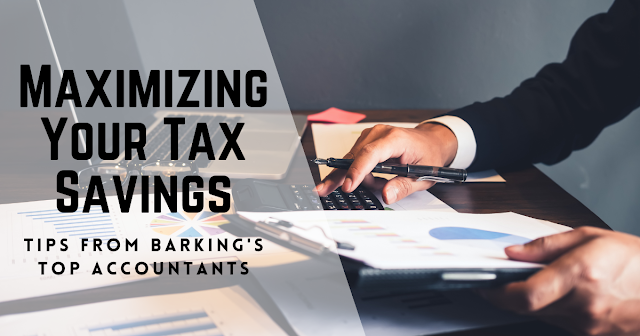Maximizing Your Tax Savings: Tips from Barking's Top Accountants
As a business owner, you're always looking for ways to save money and maximize your profits. One area where you can save a significant amount is through taxes. By taking advantage of tax deductions and credits, you can reduce your tax bill and keep more of your hard-earned money. But navigating the complex world of tax regulations and laws can be challenging. That's why we've gathered some tips from Barking's top accountants to help you maximize your tax savings.
Keep Accurate Records
Keeping accurate records is crucial to maximizing your tax savings. Make sure you keep receipts for all business expenses, including travel, meals, and entertainment. Keep a log of your mileage if you use your vehicle for business purposes. Keeping accurate records will help you identify all the deductions you're entitled to and ensure you don't miss out on any potential savings.
Take Advantage of Tax Deductions
Tax deductions are expenses that you can subtract from your taxable income, reducing the amount of tax you owe.
There are many tax deductions available for small business owners, including:
- Home office expenses
- Rent and utilities for your business premises
- Employee wages and benefits
- Advertising and marketing expenses
- Equipment and supplies
By taking advantage of these deductions, you can reduce your taxable income and lower your tax bill.
Consider Tax Credits
Tax credits are another way to save money on your taxes. Tax credits are a dollar-for-dollar reduction in the amount of tax you owe.
Some tax credits that small business owners may be eligible for include:
- Research and development tax credit
- Work opportunity tax credit
- Health insurance premium tax credit
Make sure you consult with a tax professional to see if you're eligible for any tax credits.
Plan for Retirement
Contributing to a retirement plan is not only a good way to save for your future, but it can also help you save money on your taxes. Contributions to a retirement plan, such as a 401(k) or IRA, are tax-deductible. By contributing to a retirement plan, you can lower your taxable income and reduce your tax bill.
Work with a Professional Accountant
Finally, working with a professional accountant can help you maximize your tax savings. A qualified accountant can help you identify all the deductions and credits you're eligible for and ensure you're taking advantage of all the available tax-saving opportunities. They can also provide valuable advice on tax planning strategies that can help you save money in the long run.
In conclusion, maximizing your tax savings requires careful planning and attention to detail. By keeping accurate records, taking advantage of deductions and credits, planning for retirement, and working with a professional accountant, you can significantly reduce your tax bill and keep more of your hard-earned money. Don't leave your tax savings to chance; consult with a qualified accountant today and start saving!


.png)
Comments
Post a Comment